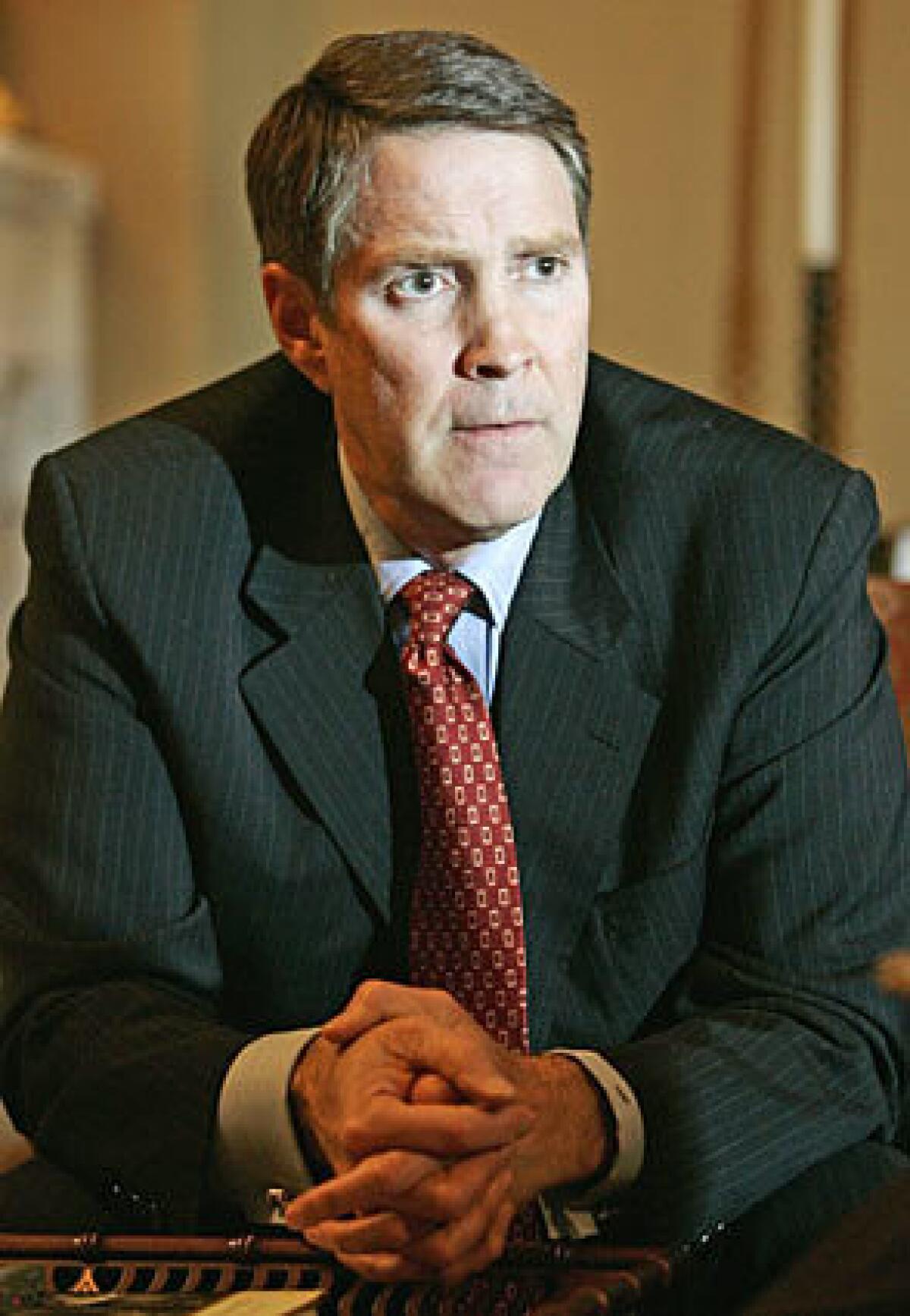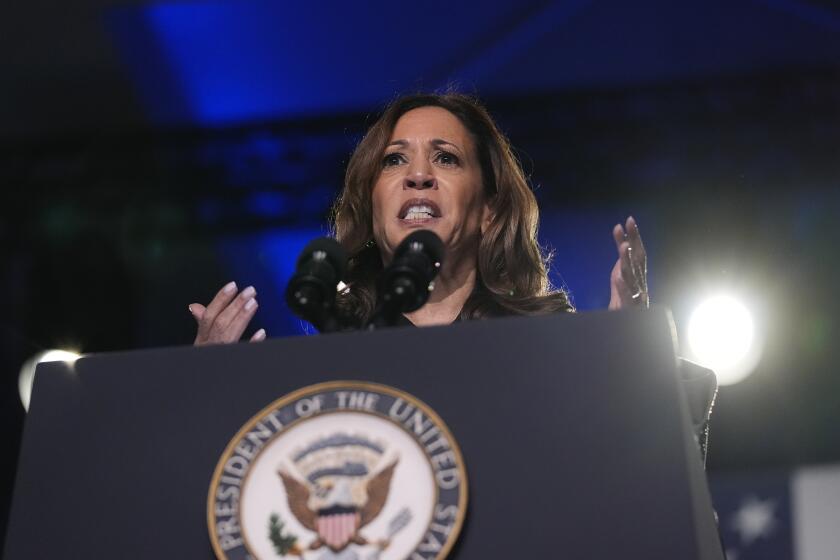Border Accord Faces ‘Chasm’

WASHINGTON — Majority Leader Bill Frist said Sunday that he wanted the Senate to vote on a far-reaching immigration bill later this week, even as the fate of the legislation remained clouded by stark differences among lawmakers over how to treat up to 12 million illegal immigrants already in the United States.
Whether such immigrants may qualify for guest-worker status and, ultimately, permanent residency and citizenship “will be the fundamental question over the next six days on the floor of the Senate,” Frist (R-Tenn.) said on CNN.
The Senate Judiciary Committee last week approved a bill that would allow many workers to remain in this country, while also strengthening enforcement and border security. House leaders have taken a harder line, focusing entirely on enforcement, including strict penalties for employers that knowingly hire undocumented workers.
Such divisions are reflected in public opinion. An Associated Press-Ipsos poll reported Sunday that 56% of Americans favored and 41% were against letting undocumented immigrants apply for legal temporary-worker status. Just over half said that illegal immigrants mostly made a contribution to this country; 42% said they were mostly a drain. Two-thirds said they were not confident that building a fence between the U.S. and Mexico would reduce the number of illegal immigrants.
Sharp disagreements among congressional Republicans have revealed a rift in the party. Some Republicans — including House leaders and Frist — have sought to address illegal immigration largely through penalties and enforcement, while others — led by President Bush — have supported ways to grant undocumented workers a type of legal status, such as through a guest-worker program.
One Republican senator suggested that the debate would shape the future of the GOP, which under Bush has tried to broaden its appeal to Latinos and other minorities.
“This is a defining moment for the Republican Party,” said Sen. Lindsey Graham (R-S.C.) on “Fox News Sunday.” “If our answer to the fastest-growing demographic in this country is that ‘We want to make felons of your grandparents, and we want to put people in jail who are helping your neighbors and people related to you,’ then we’re going to suffer mightily . Let’s solve the problem in a comprehensive way — firm, fair pathway to citizenship.”
As difficult as the debate will be, lawmakers said Sunday that it could not be avoided.
“It’s the toughest thing that I’ve done in 37 years in elective public office,” Rep. F. James Sensenbrenner Jr. (R-Wis.), chairman of the House Judiciary Committee, said on CBS’ “Face the Nation.” Sensenbrenner, one of the principal authors of the House bill, said the nation must get control of the border before considering any legalization program.
The rapid increase in the nation’s Latino population — some of it due to illegal immigration — has further charged the debate, as political strategists weigh how immigration policy will influence Latino voters, naturalized and U.S.-born. Democrats have generally supported a less punitive approach than some Republicans, although there are divisions on all sides.
Graham maintained that “there is a shift in politics going on in the Senate and the Republican Party away from a border-security-only bill to a comprehensive approach being advocated by the president.” Large demonstrations in Los Angeles and other major cities have brought home the fact that Latinos across the country are following the congressional debate.
The comprehensive approach, Graham said, involves securing the borders and punishing lawbreakers while also moving “to honestly deal with the 11 million people who are already in the country and who are working and adding value. We’re not going to put 11 million people in jail.” (The exact number of illegal immigrants is unknown; estimates range from 10 million to 12 million.)
In December, the House approved a bill that would pay for a 700-mile barrier on the U.S.-Mexico border and would make it a felony to aid an illegal immigrant. The bill included no provisions to create a guest-worker program or to establish a route to legalization for undocumented immigrants already in the U.S.
The House action enraged immigrant rights advocates and unsettled much of the business community, where many employers view immigrants as a source of needed labor, especially for coming years.
The very different bill approved by the Senate Judiciary Committee last week is headed for a climactic debate on the Senate floor. It includes some border-control provisions, such as improved surveillance technology and significant Border Patrol hiring. But it veers from the House version by proposing a path to legal status for immigrants of “good character” as well as a six-year temporary-worker program under which workers could apply for green cards, which confer permanent legal residency.
“There’s a chasm between the House and Senate,” Sen. Richard J. Durbin (D-Ill.) said on “Face the Nation,” calling the House approach “unacceptable.”
On the same program, Sensenbrenner advocated the hard-line approach of many House Republicans. Some of them are wary of guest-worker programs, seeing them as a backdoor approach to legalization that could signal to the world that the United States was not serious about controlling its borders.
“If we don’t stop illegal immigration by securing the border and cracking down on those employers who do hire a lot of illegal immigrants, there just will be more illegal immigrants coming across the border,” he said.
At the same time, Sensenbrenner may have offered a hint of compromise. “No bill will end up being the worst of all possible worlds,” he said.
Also Sunday, Cardinal Roger M. Mahony, the archbishop of Los Angeles, called on Roman Catholics in Southern California to observe a special day of fasting and prayer Wednesday in solidarity with undocumented immigrants and to pray for lawmakers as they debated immigration policy in Washington.
Mahony is to celebrate a special Mass at noon Wednesday at the Cathedral of Our Lady of the Angels in downtown Los Angeles to mark the day.
A spokesman said Mahony favored the Senate bill to create a guest-worker program and a path to legalization for undocumented immigrants, saying it was in line with the Church’s call for a “just and humane” reform.
The cardinal supported the March 25 immigration march that drew 500,000 to Los Angeles but thought the related student walkouts were “unproductive,” the spokesman said.
More to Read
Get the L.A. Times Politics newsletter
Deeply reported insights into legislation, politics and policy from Sacramento, Washington and beyond. In your inbox three times per week.
You may occasionally receive promotional content from the Los Angeles Times.










